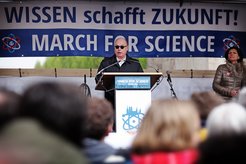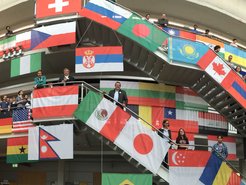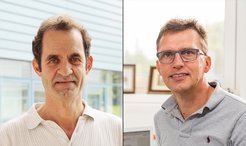Global movement for science
People were taking to the streets on the March for Science in more than 600 towns around the world
The March for Science on April 22 is a global movement in support of science and its role in politics and society. In a series of rallies across Germany, participants celebrated the "importance of science, facts and evidence-based decisions in times of 'alternative facts'" according to the organisers. Max Planck scientists also participated in the event – whether as members of the organization team, distributors of flyers among colleagues, coordinators, speakers, or participants. In Munich, Martin Stratmann, President of the Max Planck Society, held a short speech at the rally's closing.

For Detlef Weigel, Director at the MPI for Developmental Biology in Tübingen, preparations for organising the march went into high gear after Easter. Much still had to be finalised, up to the list of speakers. “And yes, there was also music,” says the developmental biologist. “The University’s Big Band was there.” The student musicians also took to the streets for the March for Science in Tübingen on Saturday, 22 April. Detlef Weigel was one of the event's main organizers. He was supported by representatives of local Max Planck institutes and members of the University of Tübingen and Tübingen University Hospital. “Especially in a town like Tübingen with its proud tradition as a scientific centre, it’s important to demonstrate in support of evidenced-based decisions in politics and society,” Weigel says.
Organisational work for the Berlin rally

Bottom-up, volunteer, independent, nonpartisan – these are some of the terms used to describe the movement. Germany hosted marches in more than 20 cities. Whether in Hamburg, Jena, or Rostock – Max Planck institutes were also amongst the initiative's supporters. Leading Max Planck scientists, including Nobel laureates, have spoken out in support of the Science March in Berlin. Claudio Paganini, a doctoral student at the Max Planck Institute for Gravitational Physics, was on the Berlin organization team (interview). The March took place in typical April weather with a mix of freezing rain and sun, starting at Humboldt University of Berlin at the Unter den Linden Boulevard and proceeding along to Brandenburg Gate.
Max Planck President Stratmann held a speech in Munich

The March for Science as a global initiative had its beginnings in the USA, where the main event will be held in Washington D.C. In the light of most recent developments in Hungary, where the Central University in Budapest is under threat of closure, and ongoing restrictions in Turkey, scientists are not just concerned with showing solidarity with US colleagues. “Scientific freedom is increasingly coming under pressure worldwide. The March for Science is an opportunity to show visible support for scientific freedom,” explains the President of the Max Planck Society, Martin Stratmann. He marched alongside protesters at the rally, which started at Karlsplatz (Stachus) and ended at Siegestor in the university district. "We cannot accept that in our day and age, when human activities are changing the planet to an extent unprecedented in history, decisions are being made without resorting to scientific facts. We shouldn't pretend to be more ignorant than we actually are", Stratmann said in his speech. Other speakers included Helmuth Trischler of the Deutsche Museum, and Munich's second mayor, Josef Schmid. According to media reports, approx. 3,000 people joined the rally in Bavaria's capital.
Flying the flag for science in Göttingen
"Science is international and knows no boundaries," emphasizes initiator Eberhard Bodenschatz, Director at the Max Planck Institute for Dynamics and Self-Organization. One day before the March for Science, the institute displayed the different national flags of all its researchers in the MPI's foyer: 65 flags in total. "After all, science is international, and as physicists we are cosmopolitan," Bodenschatz says. He believes that physics is a prime example of an empirical science, confirming theories on the basis of experiments, modifying them where appropriate, or recognizing them as false and hence abandoning them. For such considerations, a free scientific discourse is required, guided by rational arguments.
Max Planck speaker also in Jena

Another Max Planck scientist, biochemist Jonathan Gershenzon, was expected to speak in Jena. The director at the Max Planck Institute for Chemical Ecology returned from a trip from the US the day before the march. He had sent a message by email in advance: “I’ll be speaking about the main aims of the March for Science: the need to make scientific findings visible to society and the duty to raise one’s voice if science is ignored, if methods are called into question or if researchers are forced to remain silent.”
JE/CH/AO



